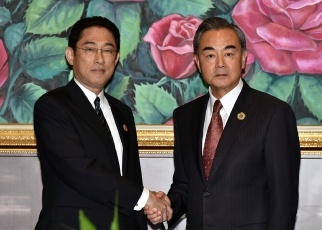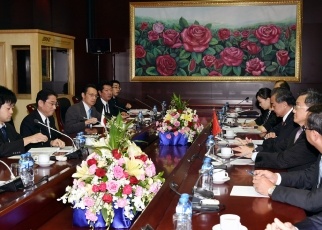Japan-China Relations
Japan-China Foreign Ministers’ Meeting
July 25, 2016


On July 25, commencing at approximately 2:40 p.m. (approximately 4:40 p.m. local time) for a little over an hour, Mr. Fumio Kishida, Minister for Foreign Affairs of Japan, who is in Laos (Vientiane) to attend ASEAN-related Foreign Ministers' Meetings, held a Japan-China Foreign Ministers' Meeting with H.E. Mr. Wang Yi, Minister of Foreign Affairs of the People's Republic of China. The overview of the meeting is as follows. (Attending from the Japanese side were Mr. Kenji Kanasugi, Director-General of the Asian and Oceanian Affairs Bureau, and others, and attending from the Chinese side were Mr. Liu Zhenmin, Vice Minister of Foreign Affairs of the People's Republic of China, Mr. Xiao Qian, head of Foreign Affairs of the People's Republic of China Asia Division and others.)
1 Opening remarks
Foreign Minister Wang Yi referred to Foreign Minister Kishida's visit to China at the end of April and expressed his desire to cherish the momentum of improving the Japan-China relationship. In response, Foreign Minister Kishida stated the following.
(1) I welcome the continuation of the high-level dialogues and mutual visits since our last meeting in Beijing, such as the summit in Mongolia, last week's visit to China by Mr. Shinsuke Sugiyama, Vice-Minister for Foreign Affairs, and so on. I would like to work together toward further improving the relationship.
(2) In our meeting today, I would like to conduct a constructive exchange of opinions from the perspectives of (a) expanding positive aspects of the bilateral relationship by expanding cooperation in economic areas among others, (b) having candid exchanges of opinions over matters of concern and deal with them appropriately, and (c) nurturing mutual understanding and trust between our peoples.
(3) In particular, there is a need to have a candid exchange of opinions between us as Foreign Ministers concerning maritime issues in light of recent developments.
(4) Prime Minister Shinzo Abe is scheduled to attend the G20 Hangzhou Summit in September. Japan also wants to make this a success, and intends to cooperate actively.
(1) I welcome the continuation of the high-level dialogues and mutual visits since our last meeting in Beijing, such as the summit in Mongolia, last week's visit to China by Mr. Shinsuke Sugiyama, Vice-Minister for Foreign Affairs, and so on. I would like to work together toward further improving the relationship.
(2) In our meeting today, I would like to conduct a constructive exchange of opinions from the perspectives of (a) expanding positive aspects of the bilateral relationship by expanding cooperation in economic areas among others, (b) having candid exchanges of opinions over matters of concern and deal with them appropriately, and (c) nurturing mutual understanding and trust between our peoples.
(3) In particular, there is a need to have a candid exchange of opinions between us as Foreign Ministers concerning maritime issues in light of recent developments.
(4) Prime Minister Shinzo Abe is scheduled to attend the G20 Hangzhou Summit in September. Japan also wants to make this a success, and intends to cooperate actively.
2 Overall Japan-China relations and the response to common challenges
(1) Following this, Foreign Minister Kishida stated the following regarding the Japan-China relationship and the response to common challenges.
- I would like to utilize the series of diplomatic events going forward to prepare specific results toward a bilateral summit meeting at the G20 Summit and an early realization of the Japan-China-ROK Trilateral Summit.
- For example, I would like to have both sides accelerate in considering specific measures on the ''five areas of cooperation''1 that I put forward on the occasion of my visit to China. I would like to hold the Japan-China High-Level Economic Dialogue soon.
- There are various exchanges that could lead to results. I would like to go forward with discussions regarding youth exchanges, motion picture exchanges, etc., which contribute to improving national sentiments.
- I would like to promote specific collaboration and cooperation regarding counterterrorism.
- I would like to collaborate with China to strongly seek self-restraint from North Korea, which is repeatedly committing provocative actions, and to demonstrate the position that North Korea's development of nuclear weapons and ballistic missiles will not be tolerated through, for example, responses in the UN Security Council.
''Five areas of cooperation'': (a) macro-economy, financial and monetary affairs, (b) energy-saving and the environment, (c) a low birthrate and an aging population, (d) tourism, and (e) disaster prevention)
- I am grateful for the statement from the Japanese side that it will cooperate toward the success of the G20 Summit. I also welcome Prime Minister Abe's visit to China on the occasion of the Summit.
- I would like to continue to work on the schedule regarding the Japan-China-ROK Foreign Ministers' Meeting and Summit.
- The ''five areas of cooperation'' including the environment and aging that Foreign Minister Kishida proposed on the occasion of my visit to China are important and beneficial to both Japan and China, so I would like to work toward specific outcomes. We can also go forward with youth exchanges and motion picture exchanges.
- Terrorism is a common issue that the international community faces, and I would like to strengthen cooperation between Japan and China.
- With regard to the response to North Korea, China will strictly implement United Nations Security Council Resolution 2270. As the chair of the Six-Party Talks, we would like to work together with each country including Japan towards the denuclearization of the Korean Peninsula.
3 The East China Sea
(1) Foreign Minister Kishida stated that the strong concern and sense of crisis that Japan harbors regarding the East China Sea, particularly the situation on the waters and in the airspace around the Senkaku Islands, must be taken seriously, and that the consultations based on the ''2008 Agreement'' regarding the issue of the development of natural resources in the East China Sea should be held soon, and expressed his desire for an early start to the operation of the Japan-China Maritime and Air Communication Mechanism between the defense authorities.
(2) In response, Foreign Minister Wang expressed his desire to continue to exchange opinions regarding the development of natural resources in the East China Sea and the desire to realize an early start to the operation of the Maritime and Air Communication Mechanism, in addition to a statement based on China's unique claims concerning the Senkaku Islands.
(2) In response, Foreign Minister Wang expressed his desire to continue to exchange opinions regarding the development of natural resources in the East China Sea and the desire to realize an early start to the operation of the Maritime and Air Communication Mechanism, in addition to a statement based on China's unique claims concerning the Senkaku Islands.
4 The South China Sea
(1) Foreign Minister Kishida candidly conveyed the Japanese position concerning the issues regarding the South China Sea, including the arbitral ruling between the Philippines and China, stating that issues concerning the South China Sea are directly connected to peace and stability in the region and are a matter of interest common to the international community including Japan, that the ruling laid down by the Arbitral Tribunal the other day is final and is binding on the parties to the dispute, as clearly stated in the UN Convention on the Law of the Seas, etc., and stated that all parties should refrain from actions that further increase tension in the region.
(2) In response, there was a statement from Foreign Minister Wang based on the preexisting Chinese position.
(2) In response, there was a statement from Foreign Minister Wang based on the preexisting Chinese position.
5 Conclusion
(1) Finally, Foreign Minister Kishida stated that it was good to have a candid dialogue, that true friends must be able to discuss difficult issues as well as positive subjects, that there are many areas where Japan and China can cooperate for peace and prosperity in the regional and international communities, that he would like to devote himself to positive cooperation and exchanges in a variety of areas from the starting point of a ''Mutually Beneficial Relationship Based on Common Strategic Interests,'' and that he wished to see further efforts for dialogues and a strengthening in the improvement of relations.
(2) In response, Foreign Minister Wang stated that he would take in the words of Foreign Minister Kishida in a positive manner.
(2) In response, Foreign Minister Wang stated that he would take in the words of Foreign Minister Kishida in a positive manner.

